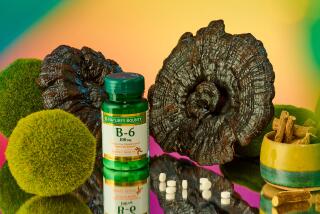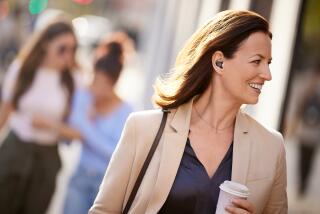Antioxidants May Sound Hope for Hearing Loss
- Share via
NEW YORK — Scientists have been accumulating evidence in lab animals for years that a pill might be able to reduce the damage that loud noise does to your hearing. Now they’re sending in the Marines.
Starting in a few months, 600 Marines at Camp Pendleton will face rifle training with not only foam plugs in their ears, but also a drink that tastes very much like Wild Berry Zinger herbal tea.
They’ll take it with every meal during their two weeks of training, an experience that normally erodes a bit of hearing from about 10% of trainees. If all goes as hoped, hearing tests will show that a substance dissolved in the drink made a difference.
It’s the latest wrinkle in research toward finding a pill that would help protect and even treat hearing loss from exposure to loud noise. The effort is hardly new, but experts say it has picked up steam in the last few years.
Nobody is saying such a pill could replace earplugs and other mechanical ear protection. But it’s clear that the standard protections so far haven’t prevented a wide-ranging problem.
Noise-induced hearing loss is one of the most common occupational diseases and the second most self-reported occupational illness or injury, the federal government says. About 10 million Americans have permanent hearing loss from loud noise, either a long-term exposure or in a sudden burst like an explosion. An estimated 30 million people are thought to be exposed to hazardous levels of noise at work, such as in mining, construction and manufacturing.
Professional musicians must take care as well. Jim tenBensel, a freelance musician in Minneapolis, packs a pair of earplugs in his trombone case. Not long ago, during a big band-style performance when he wasn’t wearing them, he found himself ducking and putting his hands over his ears when a trumpet behind him started wailing.
“It hurt,” said tenBensel, 62. “It was just a knee-jerk reaction.”
The trumpet player scolded him and tenBensel learned to put in his earplugs before that number came up.
“I think I’d rather protect my ears than anything,” said the trombonist, who’s not above sticking rolled-up paper napkins in his ears if proper plugs aren’t available.
Nor is the problem just in the workplace. Hobbies like recreational shooting, motorcycling and snowmobiling pose risks.
Earplugs and specialized earmuffs are helpful, but they’re not always enough. Some sounds overwhelm them. Some people don’t wear them when they should. Other people are unusually susceptible to hearing damage. And some sound levels can damage hearing by going through the skull, no matter what’s protecting the ears.
“Noise-induced hearing loss is such a common cause of hearing loss, and we haven’t been very effective in ways to manage it,” said Sharon Kujawa, director of audiology at the Massachusetts Eye and Ear Infirmary.
“For as much government regulation as we have for noise exposure on the job, it’s a very difficult thing to get people to comply and also to carry that out in their leisure activities,” she said.
Scientists have pursued a variety of approaches toward an ear-fortifying pill. In 1994, Israeli researchers reported that magnesium supplements helped military recruits avoid hearing loss over two months of noisy basic training. These days, researchers focus on antioxidants, the chemical class that includes vitamins C and E.
That’s because loud noise doesn’t always immediately damage the delicate inner ear. Rather, in most cases, it provokes the inner ear into making harmful oxygen molecules called free radicals. Antioxidants neutralize free radicals, and the ear naturally has such defenses. But with enough noise, the ear’s antioxidants are overwhelmed.
In that case, damage from the free radicals leads to death of the ear’s sound receptors -- hair cells that convert the mechanical energy of incoming sound waves into nerve messages to the brain. As hair cells die, hearing erodes. So it makes sense to try to build up the ear’s antioxidant defenses as a preventive step and as a fast treatment after noise exposure.
Animal experiments in prevention look promising, and “people are getting very excited about applying this to protection against noise exposure in humans,” Kujawa said.
Antioxidants should work best if given before exposure to noise, but animal work suggests that they might reduce permanent hearing loss substantially if given within four to eight hours afterward, researcher Col. Richard Kopke said.
“That’s pretty quick, but it’s doable if you’re prepared for it,” said Kopke, of the Naval Medical Center in San Diego.
One pioneer in the field of using antioxidants for hearing says he’s seen some effect in people. Dr. Michael Seidman of the Henry Ford Medical Center in Detroit got a patent in 1999 for a nutritional supplement he has recommended to several hundred patients for hearing loss caused by noise or aging.
The patients have noticed an improvement in their hearing or a slowing in the progression of their loss, Seidman said.
Kopke, who’s involved in the test with the Marines, and other scientists have gotten encouraging results in animal work from a variety of antioxidant compounds. Kopke is focusing on one called N-acetylcysteine, or NAC, which is already approved by federal authorities for treating overdoses of the painkiller Tylenol.
NAC not only neutralizes free radicals but also bolsters the ear’s own antioxidant defenses. In Kopke’s animal work, NAC has reduced hearing loss when given before or right after exposure to loud noise.
In the upcoming federally funded experiment with the Marines, half will get NAC in their flavored drink and the other half won’t. Then researchers will see if the first group fares better.
Some experts are cautious about the antioxidant approach. It makes sense that the substances could reduce hearing loss if given before exposure, but the animal studies so far haven’t varied the combination of noise levels and antioxidant doses enough to indicate how useful it might be in people, said Ed Rubel of the University of Washington.
“It’s a hot topic,” said Dr. George Gates, Deafness Research Foundation medical director. There are “snippets of information from experiments that suggest maybe it’s a good thing, but in terms of clinical application to humans, it is uncertain.”
Then there’s the Finnish disco study.
Last year, 20 healthy young people took either an antioxidant or a placebo before entering a disco in Turku, Finland. After they came out, those who’d taken the antioxidant seemed to show less hearing loss and recovered faster, although such a small study really provides only a hint of possible benefit, said Josef Miller, a University of Michigan hearing researcher.
Besides, the experiment didn’t go exactly as planned, said Miller, who helped design the study and analyze the results.
“The manager of the disco heard there were going to be some university investigators looking at the effects of noise damage and, preceding the performance that night, he turned the amplifiers down. Unfortunately, he screwed up the experiment.”
Miller is planning a prevention study with an antioxidant in the Swedish military later this year, and he notes that recent guinea pig research supports the idea that a pill might work for treatment too.
“I think it’s within our grasp,” Miller said, “and I don’t think we could have said that five-plus years ago.”
More to Read
Sign up for Essential California
The most important California stories and recommendations in your inbox every morning.
You may occasionally receive promotional content from the Los Angeles Times.












